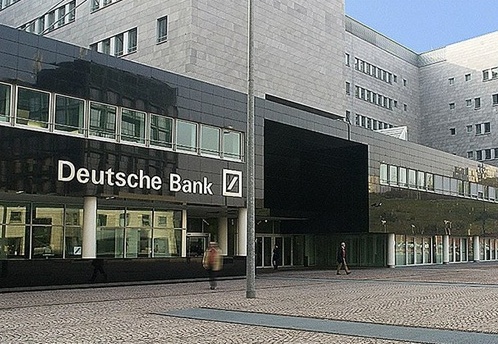Major Power Relations
Your Present Location: PROGRAMS> Major Power RelationsJia Jinjing: US penalty on Deutsche Bank may split US-European financial system
By Jia Jinjing Source: China.org.cn Published: 2016-9-22

The US suggests US$14 bn fine on the Deutsche Bank on mortgage securities in 2008 crisis.
With the economic situation in the Eurozone becoming increasingly tense, financial crisis seems to be moving ever closer. It wasn`t helped by the United States which has proposed to impose a penalty of US$14 billion on the Deutsche Bank to settle several high-profile mortgage probes in the U.S. dating back to securities the bank sold between 2005 and 2007, imparting another heavy blow to the European banking industry after the US$9 billion penalty on the Bank of Paris.
This comes at a time when the EU Summit after the British withdrawal is considering a plan to revive the "European Defense Community" concept, aiming to build an integrated European army independent from the North Atlantic Treaty Organization (NATO).
No doubt, this will completely change the U.S.-dominated defense order in Europe existing since World War II. Germany has been a keen advocate of the idea.
Prior to the penalty, the Deutsche Bank was already in the midst of a raging storm. In 2007, its stock price reached US$150 per share. But the price had been down to US$14 before the penalty was made public and it further dropped by 9.35 percent on Sept. 15, inducing collective dumping of shares in the European banking industry as a whole.
The U.S. move is rubbing salt in EU`s wound. Take Italy as an example, in the past year, the concerns about the future of the EU economy due to British withdrawal and the impact of negative interest rates on the ability of banks to make a profit simply added oil to the fire engulfing Italian banks, whose bad loan rate reached 17 percent, threatening the banking industry in Europe as a whole.
In this situation, it is more difficult for Italian banks to offset the impact of the penalty imposed on Deutsche Bank. At the same time, France and Germany, as the two states with the highest risk exposure from the Italian sovereign debt, now face the threat of a complete crash of Italian banks. A referendum is coming. Political reform and economic crisis together add to the Italian predicament.
The impact on Italian banking industry and even the whole country of Italy is the epitome of the EU dilemma. Besides Italy, a referendum is also coming in Hungary. Austria is going to have general election at the end of the year while France and Germany will be voting next year.
The EU will face great changes in its political situation. Anti-EU populist parties are gaining increased support. It is possible that Britain will start its withdrawal next January or February. While current EU leaders are working on enhancing cooperation among members, differences among them are also increasing. Therefore, the influence of the U.S. penalty on Deutsche Bank likely will cause a chain effect.
More importantly, the U.S. action will most probably become a milestone in the split of the trans-Atlantic financial system. From the U.S. sanctions on European banks to core European countries headed by Germany withdrawing gold from the New York Federal Reserve and then the British withdrawal from the EU, all indicate that the differences between the United States and Europe is becoming enlarged gradually and their mutual reliance is declining.
In the long run, it will make the TTIP negotiations, on which the United States has been working hard, more difficult. Last month, France and Germany successively announced it would be difficult for them to accept the TTIP agreement, and that they could not reach consensus with the United States.
After the United States announced penalty on the Deutsche Bank, an anti-TTIP mass parade took place in Germany. The economic cooperation that the United States has been seeking with the EU faces challenges, and the international order will face greater and more significant changes.
The author is Director of the Macro-Research Department of Chongyang Institute for Financial Studies, Renmin University of China.
Key Words: economy; bank; RDCY























































































 京公网安备 11010802037854号
京公网安备 11010802037854号





